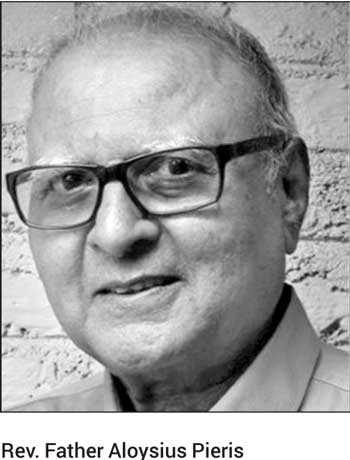Thursday Feb 26, 2026
Thursday Feb 26, 2026
Saturday, 19 January 2019 00:10 - - {{hitsCtrl.values.hits}}
 The guest speaker of this month’s ‘Poya Day (Sunday 20 January) 4 p.m. at Walpola Rahula Institute (WRI), Parliament Road, Sri Jayewardenepura, Kotte is Rev. Father Aloysius Pieris of Thulana Research Center.
The guest speaker of this month’s ‘Poya Day (Sunday 20 January) 4 p.m. at Walpola Rahula Institute (WRI), Parliament Road, Sri Jayewardenepura, Kotte is Rev. Father Aloysius Pieris of Thulana Research Center.
Father Aloysius is an expert on Asian Liberation Theology and Liberation Theology in general. He is the first Catholic priest who has done his PhD on Buddhist Philosophy. He is an exemplary Sri Lankan religious leader.
The monthly WRI Open Forum Dialogue is intended to encourage and foster liberal and innovative thought and action amongst participants on topics relevant to transforming our society into one that is more tolerant, value based, and culturally rich; and one that is respectful and appreciative of the Sri Lanka’s diversity.
The Dialogue intends to provide a safe space for participants to express their views, where active listening to views expressed, being non-judgmental on individual omissions and where the ethos of collective responsibility will be encouraged.
The need for new pathways to achieve these in keeping with Buddha’s message of loving kindness, tolerance and respect for humans is very relevant now more than ever. In keeping with the objectives of the WRI, the discussion program will neither engage in partisan politics, nor comment on political personalities but will encourage discussions on institutional strengthening and how society may be better served by stronger institutions.
Besides this, the core principle of the WRI is that wounded minds are the cause of many conflicts and that healing such minds is important to address many issues confronting our society. WRI would encourage speakers and participants to be mindful of this when reaching out for solutions for some issues confronting today’s society.
The WRI also recognises that leading by example, being role models is important if we expect others to follow In this context, to the extent possible, transformation of individuals, their attitudes and mental approaches to societal issues, cultural contexts, inter religious understanding and tolerance should form the backdrop for the purpose of these discussion sessions.
It is hoped that the participants at each forum would be encouraged to ask themselves the question ‘what would I do differently from now on, having participated in this session?’